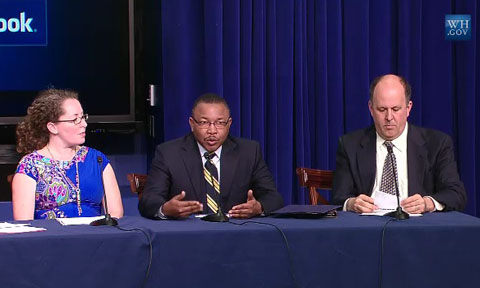In an unprecedented show of commitment and accountability by the U.S. to the prevention and elimination of mass atrocities around the world, on April 23 President Barack Obama announced the launch of the first-ever Atrocities Prevention Board, or APB. The board’s inception, which has been highly anticipated within the human rights community, marks a historic step within the U.S. government to work across agencies in a collaborated effort to prevent and respond to mass atrocities around the world.
Last August, Obama announced a Presidential Studies Directive for the establishment of the Atrocities Prevention Board, declaring that preventing mass atrocities and genocide is “a core national security interest and a core moral responsibility of the United States.” But why President Obama’s APB is so critical is because it aims to not only put mass atrocities and genocide prevention on the agenda for his administration, but to institutionalize a comprehensive strategy that will transcend political boundaries as part of a permanent government structure to further cement the norms of international human rights throughout the U.S. and the world.
President Obama made the announcement yesterday at the U.S. Holocaust Memorial Museum, marking the annual U.S. commemoration of the Holocaust. Holocaust survivor and Nobel Laureate Elie Wiesel introduced the president with a chilling testimony about how political will could have changed the outcome to what he described as “the greatest tragedy in history.”
Speaking as both the president of the United States and as a father, President Obama said we must tell our children about the Holocaust, a crime unique in human history.
“We must tell our children. But more than that, we must teach them. Because remembrance without resolve is a hollow gesture. Awareness without action changes nothing. In this sense, ‘never again’ is a challenge to us all—to pause and to look within.”
Watch Elie Wiesel’s Introduction and President Obama’s full remarks:
During his remarks, though, President Obama was quick to point out that the prevention of mass atrocities and genocide does not invoke U.S. military intervention every time there is an injustice in the world. The United States has various diplomatic, political, and economic tools that the administration has employed over the past three years, and will continue to employ and develop, to save countless lives. He referenced examples such as the determined diplomacy that led to the successful referendum between Sudan and South Sudan last July, and the recent deployment of American advisors to central Africa to help end the Lord’s Resistance Army, or LRA.
President Obama made the critical announcement that after the U.S. military advisors’ initial 150 days of deployment to central Africa, the National Security Council has reviewed their progress and decided they will continue their efforts to bring Joseph Kony and his top commanders to justice, facilitating the collapse of the LRA.
The president also used the occasion to introduce an Executive Order authorizing a new program of sanctions, Grave Human Rights Abuses Via Information Technology, or GHRAVITY sanctions, aimed at those who facilitate serious human rights abuses in Syria and Iran through such means. “These technologies should be in place to empower citizens, not to repress them,” he explained.
This type of innovative thinking will be a crucial approach to counteract mass atrocities in the 21st century. “You’ve harnessed the tools of the digital age—online maps and satellites and a video and social media campaign seen by millions,” President Obama said to the crowd. “You understand that change comes from the bottom up, from the grassroots.”
And that is why one of the APB’s first tasks will be to meet with citizens and activists from civil society. The board, chaired by Samantha Power, special assistant to the president and senior director of multilateral affairs for the National Security Council, convened for the first time yesterday at the White House and then participated in a public discussion as part of the event, “Honoring the Pledge of Never Again.”
Samantha Power explained that the board will supplement work the President is already doing. It will ensure that the most critical issues rise to the top and get beyond the bureaucratic red tape and in front of policymakers.
U.S. Under Secretary of State for Democracy and Global Affairs and APB member Maria Otero described how this translates into action within her own agency. “This means that we at State need to use the lens of atrocity prevention across the board in everything that we do,” she said. “The challenge for us is to develop a new level of diplomat that is going to incorporate into everything they do this consideration”
Following the brief discussion with members of the APB, the White House convened several panels focused on current trends in the fight against mass atrocities and existing conflicts such as Sudan and the LRA. Enough Project Senior Advisor Omer Ismail participated in a panel discussing the pledge of “Never Again,” and Enough Project Communications Director Jonathan Hutson participated in a panel that focused on the role that modern digital technology can play in the prevention and prosecution of human rights atrocities.

“[The APB] has been a dream and we all wanted to see this happen,” said Ismail. “To institutionalize this and to get all the agencies to work on this is a dream for those of us who have been on the front line for years.”
The Enough Project welcomes this positive step and plans to work with the board, as well as Congress and other parts of the Obama administration, to support U.S. efforts to protect civilians from mass atrocities and to hold the perpetrators of these crimes accountable.
Photo: Enough Project Senior Advisor Omer Ismail speaking on the White House panel discussion "Never Again." (White House)

